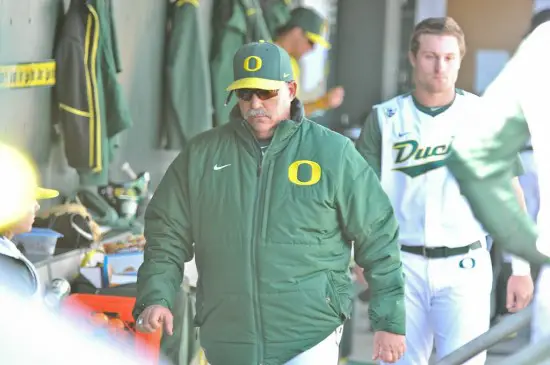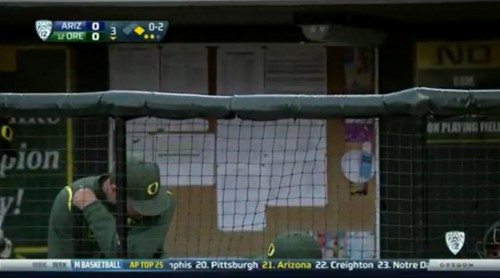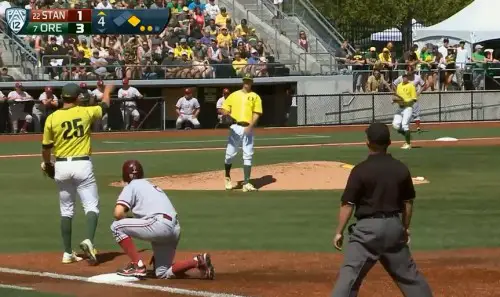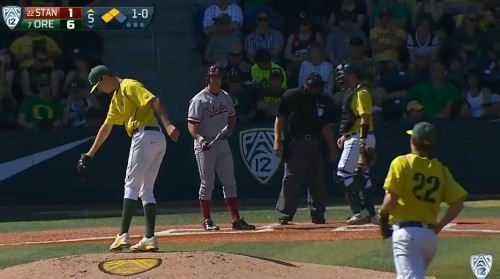Unfortunately, coach George Horton’s impact on the Oregon baseball team can’t be fully measured. He’s supposedly an excellent recruiter and I’m sure he motivates his players like General Patton, but there’s just no way of knowing what his effect in these areas truly is.
Horton has so many tangible strengths, though, that figuring out if he’s a good coach is like discovering that Ryon Healy is big.
Maybe the most important on-field impact a coach can have is in the management of his pitching staff. The starting rotation would seem to be the easiest part, but calling this “easy” is an insult to all managers, especially Horton.
First of all, there’s a ton of pressure on a coach to decide how long a starter should go. If a pitcher’s performance dips or – gulp – he suffers an arm injury, guess who receives the blame? The coach does almost every time.
But this is just one of a few tough things Horton has to think about with his starters. He also calls every pitch a starter (and reliever) makes, which requires an extensive knowledge of both his pitchers and the opposing batters (more on this later).
To the surprise of absolutely no one, Horton is a master of pitch selection. Oregon pitchers throw sliders, curveballs, and changeups all of the time in “hitter’s counts”, which are generally counts where hitters expect fastballs in the strike zone. Even if the pitcher misses the zone, these unpredictable pitches make opposing hitters uncomfortable throughout the game
Horton has been fortunate to have three starters – Tommy Thorpe, Cole Irvin, and Jake Reed – who have been effective and healthy (knock on wood) all season, but Horton has needed to find other pitchers to start on the days when his three horses get their regular rest.
In most of these games, the “starting pitcher” is only a technical term because he’ll rarely be in for more than 2-3 innings. Horton relies heavily on his bullpen, but he does so while taking health, effectiveness, and game situations fully into account.
His utilization of closer Jimmie Sherfy is the best example of this. Sherfy has appeared in 31 games this year but he’s only pitched in 33 innings. Last season, Sherfy made 36 appearances and pitched in 61.1 innings. It’s as if Horton made it his mission to keep Sherfy as fresh as possible in 2013.
Take a look at what Sherfy did after this game on April 27 versus Stanford, for instance. Sherfy made his only 2-inning appearance of the season that day, and Horton kept him on the bench the next three games, even though two of those games were tight going into the ninth inning. Horton might have wanted to use his closer in at least one of those games, but Sherfy’s health is much more important than any one regular season game could ever be.
It’s no coincidence that Sherfy has been completely dominant this season while pitching fewer innings.
——–
During Oregon’s game against Arizona on March 22, color commentator and former major-leaguer J.T. Snow mentioned something he noticed in the Ducks dugout:
As you can see, that bulletin board is covered with sheets and charts. Snow said these had just about every conceivable piece of information about Arizona on them.
“It’s almost like a major-league operation,” Snow said.
This gets back to my point about the ridiculous amount of knowledge Horton needs to call pitches. Every hitter has a laundry list of strengths and weaknesses, so Horton’s goal with these stat sheets is to learn everything he can about opposing hitters and attack them accordingly.
Hitting tendencies are also just a fraction of the information on these sheets. Horton has in-depth data on opposing pitching, defense, and baserunning, and he does this for every team Oregon faces. This info isn’t just beneficial to him; it also prepares his assistants and players. The more every Duck knows about his opponent, the better chance Oregon has at winning individual games and improving throughout the season.
——–
There’s one thing the Ducks have done in every game I’ve seen them play:
In these shots, Ducks infielders (Mitchell Tolman in the first one, J.J. Altobelli in the second) jog behind pitcher Cole Irvin each time the first baseman or catcher threw the ball back to him. Oregon infielders basically do this every time runners are on base because if a throw gets away from the pitcher, they’re in position to quickly grab the ball and keep runners from advancing.
Of course, a botched throw to the pitcher almost never happens. It’s the simplest throw and catch baseball players can make, and it’s something catchers, first basemen, and pitchers have done so often throughout their careers that it’s probably become muscle memory at this point.
So, why do I even bring up this inconsequential defensive tactic? Because it illustrates just how much attention Horton gives to every single aspect of the game.
A throw to the pitcher might get away one time in a million, but Horton doesn’t care how slim the odds are. If that one error occurs, Horton wants to be absolutely sure that a runner doesn’t move up a base as a result.
He’s like an automobile engineer who sees a partially loose screw on one of the car doors. This might never cause an issue, but he’s not approving that vehicle until the screw is as tight as possible.
By the way, botched throws back to the pitcher have cost teams games before.
There was also this Angels-A’s game from 2005 that ended on the same type of gaffe. One thing’s certain: you’re never going to see a Horton-coached team give up a run this way.
Horton’s greatest strength is this reverse-Murphy’s Law mentality: what can go wrong will NEVER go wrong on my watch. This is why his use of pitchers has been so careful, and it’s why he has MLB-caliber information sheets in the dugout. Anything can happen in baseball, so his team can never be too prepared.
The craziest part about all of this: Horton’s on-field impact is just a piece of the overall value he brings to the Ducks. That’s right, Horton might actually be a better coach than we think.
Related Articles:
Victor is a senior at the University of Oregon, majoring in journalism and minoring in psychology. Victor was born and raised in San Francisco, CA. He is a fan of the San Francisco Giants, San Francisco 49ers, and Golden State Warriors and has naturally fallen in love with the Ducks since he became a UO student. He currently works for the UO campus radio station 88.1 KWVA as a news and sports contributor and hopes to one day become a professional sports reporter. While he loves several sports, baseball has always been his greatest passion.





